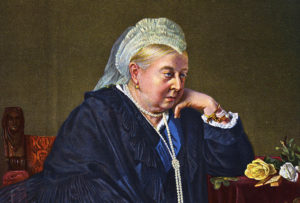It is an odd time for my profession. Everyone thinks historians should comment on the death of Queen Elizabeth II. But, at the same time, we are expected to come out with nothing but sententious platitudes. Hearing Sir Simon Schama tell a television audience that “millions of Britons are feeling orphaned” put me in mind of Motley’s description of William the Silent in his History of the Dutch Republic: “As long as he lived he was the guiding star of the whole nation and when he died the little children cried in the streets.” As it happens, I went out onto the streets of my native Birmingham shortly after watching half an hour of Huw Edwards being solemn on the BBC and, I have to say, no one seemed to be crying or, indeed, much concerned with anything except getting dinner.
The death of the Queen might eventually invite more sceptical and wide-ranging reflection. Georges Clemenceau said of the French Revolution that it was a bloc — to be accepted or rejected as a whole; the same is true of the British royal family. Any individual monarch is the product of an institution that revolves around the hereditary principle. Real monarchists must ask themselves whether they believe in this system enough to accept all its potential consequences. Remember that if Prince Charles had broken his neck playing polo in 1976, we would now be awaiting the coronation of King Andrew.
Curiously, a “successful” monarch and, especially, a long reign weakens the monarchy as an institution. During such a reign, loyalty comes to focus on a person, rather than on the Crown as an institution. Note how frequently, in recent years, politicians have answered questions about their views on monarchy with some anodyne remark about their admiration for the Queen. The cult of an individual sovereign increasingly overshadows all other members of their family, including their eventual successor.
That heir, waiting in the wings, will have accumulated a great deal of baggage by the time that they get to the throne — whether that baggage means actresses and obesity (as in the case of Edward VII) or an unsuccessful marriage and a history of publicly expressing political views (the case of Charles III). The problems of a long reign are exacerbated when the monarch is a woman. Partly because they were comparatively rare in British public life until recently, Queens lend themselves to mythologisation.
There are two striking and worrying precedents for what happens when a long-serving monarch dies. The first is Elizabeth I. Her death was followed by an unsuccessful king (James I), a catastrophic king (Charles I), civil war, regicide and, for a time, republic. The second is Victoria, whose death was also followed by a period of turbulence for the monarchy, culminating in the abdication crisis of 1936. I am not being entirely flippant when I say that the First World War was, in some ways, a civil war within Victoria’s own family — in which the English branch came off much better than the German or Russian ones.
Their long reigns served to occlude problems that then came back to haunt the next monarch. Elizabeth I — who refused to “open a window into men’s souls” — was careful to cultivate a useful ambiguity over religion. But that ambiguity was linked to her personal idiosyncrasies — her refusal to marry, for instance, avoided the question of whether she would take a Protestant or Catholic husband — so that it was hard for the monarchy to sustain after her death.
The ambiguity of Victoria’s reign was less deliberate. Her long period on the throne and, particularly, her partial withdrawal from public life after the death of her husband, helped to conceal the extent to which (much to Victoria’s own distaste) the monarchy had lost its political power during her reign. It was significant that politicians did not consider it necessary to call a general election when she died: they had done so as a matter of course after the previous monarch’s death. Still, the monarchs that came after her did not really reconcile themselves to the institution’s loss of political power until the accession of George VI in 1936.
The central ambiguity of Elizabeth II’s long reign revolves around Britain’s relations with the wider world. Before her accession, she pledged herself to serve “our imperial family”. But the empire went in the early years of her reign and was replaced by the Commonwealth — Enoch Powell, always attentive to the precise meaning of constitutional terms, believed that the most important speech he ever made concerned the addition of the letter “s” after “realm” in the Royal Titles Bill of 1952. Elizabeth’s death has now raised awkward questions, long suppressed, about what the Commonwealth itself means and, in particular, whether the British monarch will remain its head.
In some ways, the personalisation of the monarchy is more marked now than it was in 1901 or 1603. This is partly because of other changes in the British state. It is often suggested that every aspect of the constitution hinges on the monarchy. But in some ways, the reverse is true: the institutions of the British can get along perfectly well without a monarch — as was shown during the interregnum of 1649-1660 — though the monarchy has, in the past, been sustained by its relations with an infrastructure of ancien regime institutions.
In 1953, I suspect the Queen herself would have said that being head of the Church of England was the most important of her duties. Now the idea of a state church seems peculiar — most vicars would give you a blank look if you point out that parliament has not sanctioned the prayer book used in most churches. As for the House of Lords, it is now, for the most part, an assembly of retired, middle-ranking politicians — not a single one of the six surviving former prime ministers has bothered to take a peerage. The institutions that have long propped up the monarchy are ailing.
She was also always held to be above politics and often presented as representing an integrity that elected politicians lack. Yet the briefest glance at the register of members’ interests or parliamentary expense claims reveals that MPs most interested in personal enrichment tend to be fervent admirers of the Queen — and keen collectors of honours. One might also point out that two of the most important figures at the court of King Boris (the cabinet secretary, Simon Case, and Lord Geidt, advisor on ministerial standards) had previously worked in the royal household.
For all the talk of the monarchy being “apolitical”, no serious observer doubts that the monarchy serves the interests of the Conservative Party — often, as when George V promoted “National Government” in 1931, serving those interests by going along with the Conservative claim that their own policies were “apolitical”. A group of MPs closely associated with Thatcherism, including Norman Tebbit and Nigel Lawson, wrote an interesting document in 1978. They were struck by the show of affection for the Queen during her Silver Jubilee; they recognised that it might reflect “a deep nostalgia, in part for what is thought of as a comfortable past”, suggesting that they needed to be careful with calls for radical change. All the same, they concluded that the spirit of the Jubilee would work to their advantage: “People will be more attracted by a promise … to restore some of the valued things they have lost than by promise of a vague, bright tomorrow.”
But Conservatives are not quite the royalists they sometimes make out. They are heirs to a political tradition that looks back to the Glorious Revolution of 1688 (when James II was abruptly ejected from the throne) and emphasises the pre-eminence of the parliament — especially the House of Commons. Churchill paid ostentatious deference to the young Queen Elizabeth and took the side of Edward VIII during the abdication crisis of 1936. All the same, Churchill was blunt to the latter: “When our kings are in conflict with our constitution, we change our kings.” He also, as First Lord of the Admiralty, once tried to name a ship HMS Oliver Cromwell.
Conservatives found it easy to be loyal to Elizabeth II because her public statements — in favour of family, nation and the armed forces, and prone, in recent years, to evoke a certain memory of the Second World War — fitted with their own political vision. It will be interesting to see how they get on with a monarch who recently, albeit unintentionally, let it be known that he disapproves of their asylum policy and who has devoted much of his life to drawing attention to the dangers of climate change.
King Charles will, I suspect, not have an easy time. His reign will be relatively short and he will spend much of it in the shadow of his mother. The historian Peter Hennessy recently wrote that his generation (he is more or the less the same age as the King) found it hard to imagine any monarch other than Elizabeth II. Like many remarks that sound conservative, this is, when you think of it, profoundly subversive. Saying a monarch other than the present one if unthinkable is, in effect, saying that the continuation of monarchy is unthinkable.
And, while we are on the subject of unthinkable things, consider the dramatic constitutional rethinking likely to be brought about by, say, the break-up of the union, an attempt to re-enter the European Union, or the creation of a written constitution — all things desired by a significant minority of the population and all things that might raise questions about who should be head of state. For all the talk about centuries of continuity, I doubt if any realistic observer is sure the monarchy will survive for another 70 years. If it is to do so, it needs to get away from an emphasis on the supposed personal qualities of any individual King or Queen and rest once again on the abstract quality of the Crown. Perhaps one day historians will recognise that the most important constitutional commentator of the period was not Sir Simon Schama or Lord Hennessy but Johnny Rotten, who marked the Silver Jubilee of 1977 with the words: “She ain’t no human being.”
Disclaimer
Some of the posts we share are controversial and we do not necessarily agree with them in the whole extend. Sometimes we agree with the content or part of it but we do not agree with the narration or language. Nevertheless we find them somehow interesting, valuable and/or informative or we share them, because we strongly believe in freedom of speech, free press and journalism. We strongly encourage you to have a critical approach to all the content, do your own research and analysis to build your own opinion.
We would be glad to have your feedback.
Source: UnHerd Read the original article here: https://unherd.com/






